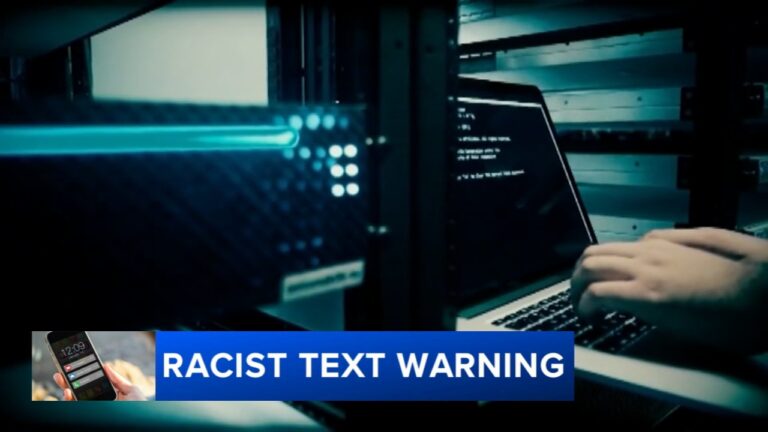Racist Text Messages Emerge After Recent Election Results
Election Fallout: Racist Texts Rock Communities
Recent elections in the US have sparked not just political debates but also some unsettling revelations that leave a sour taste in the mouths of many. You might have heard whispers about an ugly trend: racist text messages surfacing after the election results. These messages are not just shocking; they are a chilling reminder of the racial tensions that simmer beneath the surface of our society. In this article, we’ll dive into this disheartening issue, examining what these messages reveal about our political landscape, the impact on communities, and how we can move forward.
The Context of Racist Messages: What Are We Really Talking About?
Let’s paint a picture here. Imagine you wake up, scroll through your phone, and find a barrage of text messages that make your stomach drop. That’s the reality for many people who were on the receiving end of these racist communications after the election. What do these messages say? Well, they often include derogatory comments, slurs, or implied threats that reflect deeply ingrained prejudices. At their core, they are a manifestation of fear and anger, typically aimed at communities of color or marginalized groups.
Why Now?
Following elections, emotions run high. People are passionate about their beliefs, and with the rise of social media, communication has become instantaneous. Unfortunately, this also means that hateful sentiments can spread like wildfire. When election results don’t align with certain expectations, the backlash can be swift and ruthless. These texts serve as a potent reminder that many individuals struggle to grapple with the changing demographics and societal norms in America.
Unpacking the Message: What Do They Say?
At this point, you might be asking: “What exactly are these messages saying?” The specifics can vary widely, but they often contain:
- Racial slurs: Words meant to demean individuals based solely on their race.
- Threatening tones: Messages that intend to intimidate or instill fear within communities.
- Stereotypes: Reinforcing negative stereotypes that have persisted for generations.
For example, some messages launched attacks against the racial or ethnic backgrounds of politicians or voters, dehumanizing them and reducing them to caricatures built on ignorance. Such messages aren’t just words; they can have harmful emotional and psychological impacts on those targeted.
The Impact on Communities: A Closer Look
So, what does all this mean for the communities at the receiving end of these nasty messages? For starters, the emergence of these racially charged texts can create an atmosphere of fear and anxiety. People may feel unsafe in their neighborhoods or isolated from their community members. It’s a bit like tossing a stone into a pond—ripples of discomfort spread outwards.
Emotional and Psychological Consequences
The emotional weight of receiving such messages should not be underestimated. Victims may experience:
- Increased anxiety: The feeling that threats are not just words but genuine concerns for personal safety.
- Isolation: Seeing no one stand up against such racism can make individuals feel alone.
- Anger and frustration: There’s a natural tendency to respond emotionally when faced with hate, which can lead to further polarization in society.
Community Response: How People Are Reacting
Communities aren’t taking these incidents lying down. People are coming together to denounce racism actively. From holding rallies to creating hashtags that spread awareness, many individuals potentiate change through unity. Here are some common responses:
- Community dialogues: Some neighborhoods are setting up forums for dialogue to discuss race relations openly, allowing people to express their feelings and perspectives.
- Educational initiatives: Schools and organizations are offering programs designed to educate individuals about racism and its impacts, helping to foster empathy and understanding.
- Social media campaigns: Activists are using platforms to showcase experiences and promote anti-racism, effectively turning negative narratives into positive change.
Strategies for Combating Racism in Our Communities
It’s easy to feel overwhelmed; the issues can often seem too vast for an individual to tackle. But remember, every little bit helps. Here are practical strategies that can be employed to combat racism and foster a harmonious environment:
-
Speak out: If you receive or witness racist messages, don’t stay silent. Denouncing such behavior can help create a culture of accountability.
-
Educate yourself and others: Arming yourself with knowledge on racial issues can empower you to discuss and dismantle racial biases.
-
Build diverse networks: Engage with friends and colleagues from different backgrounds to foster understanding and respect.
-
Support local initiatives: Join or volunteer with organizations fighting against racism, helping create tangible change in your community.
-
Encourage open dialogue: Regularly engage in conversations about race, allowing various perspectives to surface and leading to greater awareness.
Moving Forward
Now that we’ve unpacked this mess, where do we go from here? Society thrives on communication, and while it can sometimes take a dark turn, it also lays the groundwork for progress. As difficult as it is to confront hateful rhetoric, every discussion, every rally, and every moment of solidarity serves as a step toward a more inclusive future.
It Starts with Us
For change to occur, it starts with us—individuals willing to stand up against hatred. The true essence of community lies in unity regardless of our differences. We shouldn’t just acknowledge that racial prejudice exists; we must actively challenge it. Maybe you read this article and think about some of the ways you can make a difference. Whether that’s getting involved locally, educating peers, or amplifying voices from marginalized communities, it all counts.
Conclusion
The emergence of racist text messages post-election is a stark reminder of the societal divisions we face. It’s not just about politics; it’s about the humanity behind every vote and every message. By engaging in open conversations, supporting affirmational initiatives, and standing against hate, we can create a stronger, more inclusive society.
Now, more than ever, we must unite to combat racism in all its forms. After all, it’s not just about what happens in the political arena; it’s about fostering a world where everyone can coexist peacefully and with respect.
FAQs
1. What should I do if I receive a racist text message?
If you receive a racist text, document it, do not engage directly, and consider reporting it to local authorities or a harassment hotline.
2. How can I help combat racism in my community?
You can volunteer with local organizations, participate in community discussions, and educate yourself on racial issues.
3. What impact do racist messages have on communities?
They can cause fear, anxiety, and isolation, leading to a breakdown in community trust and relationships.
4. Is there any way to track the prevalence of these messages?
Yes, some studies and organizations collect data on hate crimes and racist rhetoric, including texts and online communications.
5. Can I approach someone who sends racist messages to encourage change?
Yes, but approach with care. Open, non-confrontational dialogue can sometimes foster understanding and change attitudes.







